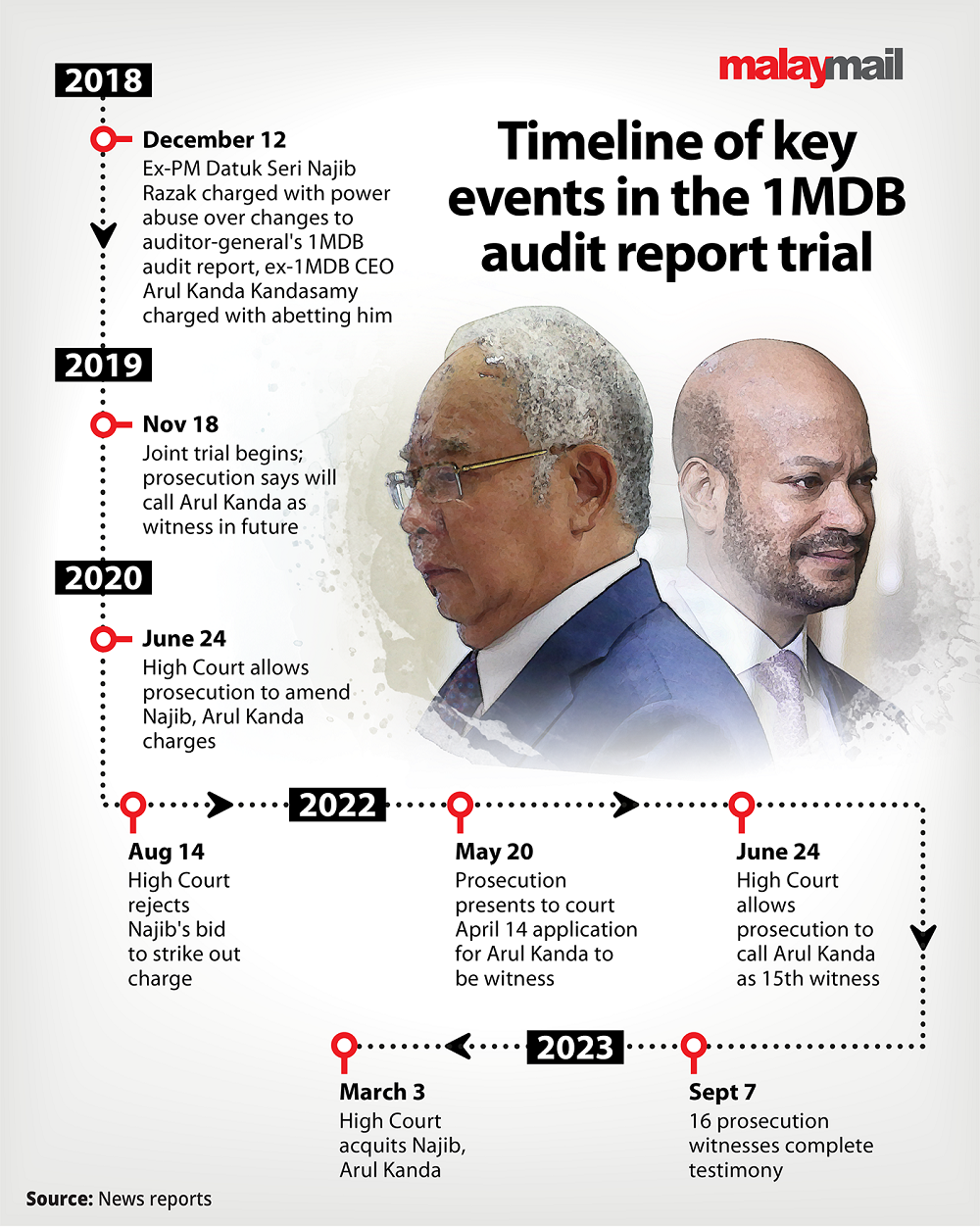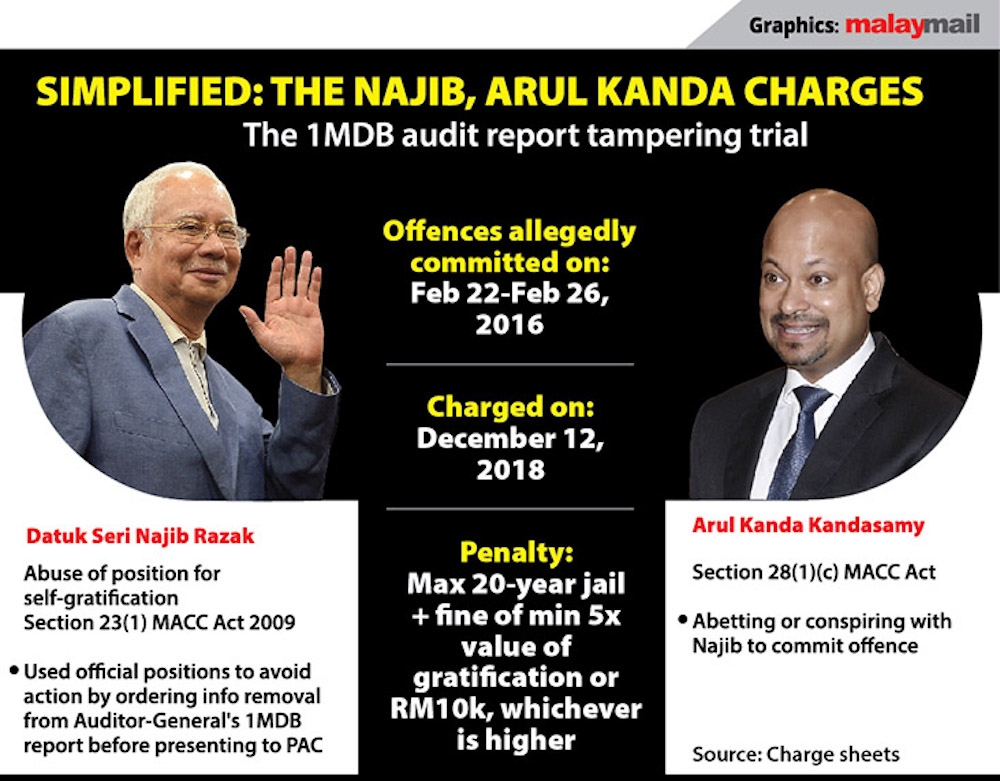KUALA LUMPUR, March 3 — The High Court today acquitted former prime minister Datuk Seri Najib Razak from his trial over the removal of key information from the auditor-general’s 2016 report on 1Malaysia Development Berhad (1MDB).
Judge Mohamed Zaini Mazlan ruled that the prosecution had failed to prove a prima facie case for Najib to answer.
This means the former finance minister will no longer have to face the charge under Section 23(1) of the Malaysian Anti-Corruption Commission Act 2009.
In this trial, Najib is accused of having abused his position as prime minister and finance minister between February 22 and February 26, 2016, by allegedly instructing for amendments to the 1MDB audit report — which was already ready to be presented to the PAC — before it was finally presented to the PAC.
Najib is accused of having done so to protect himself from civil or criminal action over his role in the handling of 1MDB operations.
In order to prove a prima facie case for Najib to defend himself, the prosecution would have to prove all elements of the Section 23(1) charge against him, namely that Najib is an officer of a public body and that he used his office for "gratification".
The High Court noted that there was no dispute with the first element as Najib was an officer of a public body as the prime minister and finance minister then, but concluded that the prosecution failed to prove the second element involving gratification. This ultimately led to Najib's acquittal today.
Under the facts of the case, Najib had received a copy of the 1MDB audit report (which the National Audit Department was already ready to present to the PAC), before having a meeting on February 22, 2016 at his office with the auditor-general and with the chief secretary to the government and Najib's principal private secretary present.
After this meeting, Najib instructed the then chief secretary to the government --- the late Tan Sri Ali Hamsa --- to hold a meeting between the auditor-general and former 1MDB CEO Arul Kanda Kandasamy.
Ali then called for a meeting on February 24, 2016 at his office which was attended by the auditor-general, a National Audit Department (NAD) officer, Arul Kanda, representatives from the Treasury and Attorney-General's Chambers, while subsequent meetings were held on February 25, 2016.
Following those discussions or meetings, four key amendments or removals were made to the already-published 1MDB audit report, with the amended report which was published on March 2, 2016 being the version that was eventually presented to the PAC.
The four key changes include the removal of mention of the existence of 1MDB's two different financial statements for the financial year 2014 and the auditor-general's recommendation for further investigations to be taken, and removal of mention of Low Taek Jho's presence in a 2009 board meeting. The summarised list of four key amendments can be found here.
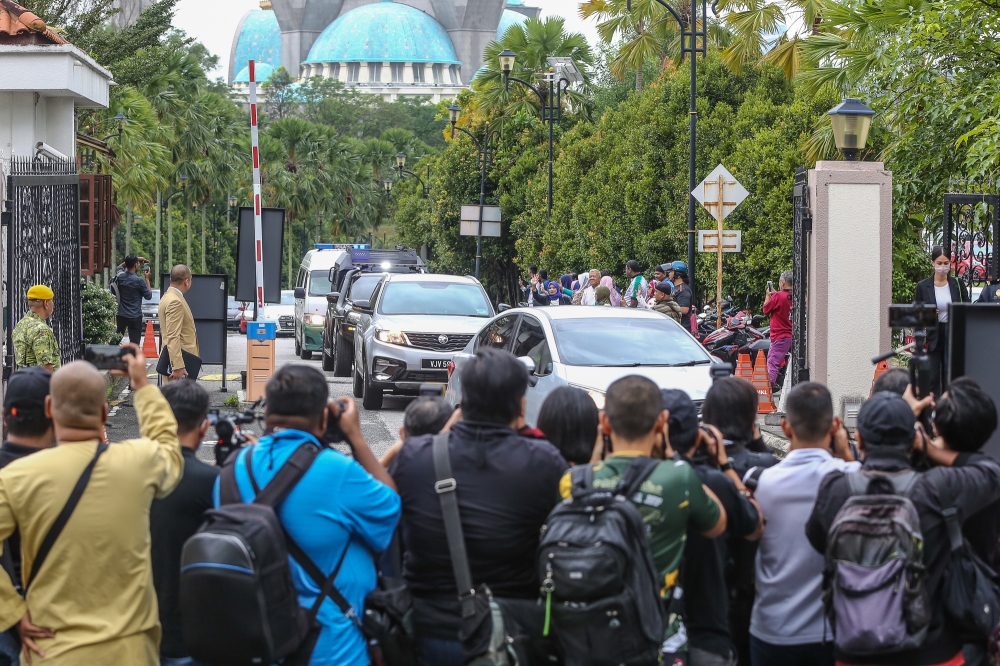
In reading brief excerpts from his full judgment, Zaini highlighted his observations regarding Tan Sri Ambrin Buang, who was the auditor-general at the time the 1MDB audit report was prepared and later amended. Ambrin was the sixth prosecution witness in this case.
Zaini noted the appointment and security of tenure of an auditor-general is similar to that for judges.
Zaini noted that the auditor-general’s security of tenure is guaranteed under the Federal Constitution’s Article 105 and is also given wide powers to perform his duties under the Audit Act 1957.
(Based on Malay Mail's checks of the Federal Constitution, Article 105 among other things state that an auditor-general is to be appointed by the Yang di-Pertuan Agong on the advice of the prime minister and after consultation with the Conference of Rulers, and that the auditor-general may resign at any time but shall not be removed from his position except on the same grounds and same way in which a Federal Court judge may be removed.)
“The AG, is therefore, given the independence to carry out his duties without fear or favour. There are consequently very few reasons, if any, for the AG to be cowed, coerced or forced to make any decisions contrary to his belief or duties,” the judge said.
Referring specifically to Ambrin, the judge said he observed the former auditor-general to be a “very principled and no-nonsense person”.
“He strikes me as determined to carry out his duties diligently and does not suffer fools gladly. He would answer any questions posed to the point and did not mince his words where required. He is the epitome of professionalism,” he said.
Zaini said the amendments to the already-published 1MDB audit report were made based on Ambrin’s judgment and agreement, and that these changes were done based on further information and documents provided by former 1MDB CEO Arul Kanda Kandasamy to the National Audit Department.
Zaini said it would not have been necessary for Arul Kanda to later provide more information if 1MDB’s management had been more cooperative before the audit report was published.
The judge also found that it was also “not extraordinary” that the information came later from Arul Kanda on 1MDB’s behalf, as the then auditor-general Ambrin had accepted that an auditee could participate in discussions on an audit report.
On Ambrin, the judge said: “There was no evidence to prove that he was forced to attend the meetings or make changes to the audit report.”
In this case, Najib was accused of instructing for the amendments to the audit report, to seek “gratification” for himself by seeking to protect himself from civil or criminal action over his role in handling 1MDB’s operations.
But for the “gratification” which Najib was accused of seeking, Zaini agreed with Najib’s lawyer that there was “no causal link” or no connection between the amendments made and the alleged gratification.
“There is no evidence to suggest or prove that the second accused had explicitly directed the amendments made to exonerate him from any civil or criminal liability. He was merely concerned that the report could be spun politically,” the judge said, referring to Najib as the second accused person in this case.
The judge said the prosecution has not shown how the information which were removed from the 1MDB audit report could result in civil or criminal liability to Najib, and noted that Ambrin had said the amendments were “justified”.
The judge himself was also of the opinion that the items that were taken out or the amendments to the 1MDB audit report "would not expose or give rise to any civil or criminal liability" to Najib.
“I also observed that the items amended or taken out were known to the PAC and openly discussed,” the judge said, and ruled that the presumption under Section 23 of the Malaysian Anti-Corruption Commission Act cannot apply as the prosecution could not prove gratification.
Under Section 23 which was the offence Najib was charged under, he would have been presumed to have used his position for gratification unless it is proven otherwise. As the judge found the presumption of corrupt intention under Section 23 does not apply, the judge ultimately decided to acquit Najib without ordering him to defend and explain himself.
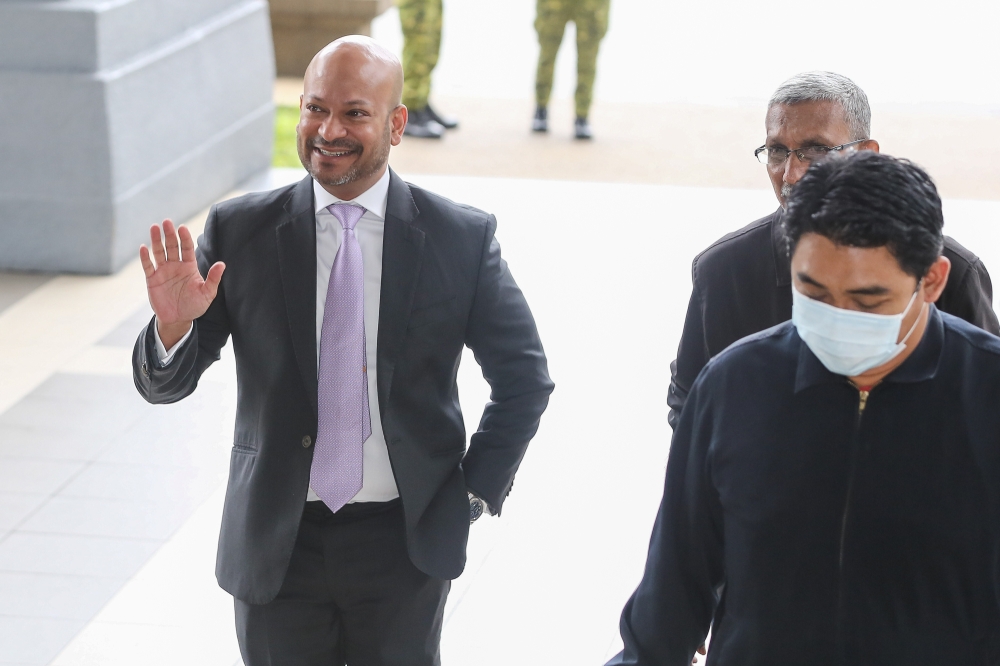
Former 1MDB CEO Arul Kanda Kandasamy, who was also on trial as he was accused of abetting Najib, had however also testified as the 15th prosecution witness.
The High Court also acquitted Arul Kanda.
Arul Kanda was testifying under Section 63 of the Malaysian Anti-Corruption Commission (MACC) Act 2009, which enables persons charged under the MACC Act to be given a “certificate of indemnity” if they are called to testify as a prosecution witness and if the court finds that he has made a “true and full discovery” of all things which he had been asked about.
Zaini previously said a certificate of indemnity would result in Arul Kanda’s acquittal, while a failure to obtain such a certificate would result in him ceasing to be an accused person in this trial and with the prosecution able to charge him again and to have a different judge hear his trial.
Zaini previously explained that the test in deciding whether Arul Kanda has made a “true and full discovery” would be whether he has told the whole truth throughout his entire time as a prosecution witness in this trial, and said Arul Kanda would be entitled to the certificate of indemnity if the court finds that he has been a truthful witness.
Today, Zaini repeated his previous views that it would not matter whether Arul Kanda’s testimony favours the prosecution or the defence as long as he has made a “true and full discovery”, and also reiterated that all Arul Kanda has to do is tell the truth or he would lose the privilege of getting the certificate of indemnity.
In determining whether Arul Kanda had told the full truth as a prosecution witness which would then entitle him to a certificate of indemnity and to then be acquitted, the judge looked at what he had testified.
Zaini observed that Arul Kanda was consistent throughout his testimony as a prosecution witness, and said it was clear that he had honestly answered the questions posed to him and to the best of his ability.
The judge said Arul Kanda’s testimony was compatible with the documents presented in court and the testimonies of other prosecution witnesses.
While Zaini acknowledged it was possible for Arul Kanda to testify in a way that would minimise his role and amplify any wrongdoings by Najib, the judge however found that Arul Kanda did not testify in such a way.
The judge found that Arul Kanda’s testimony was in favour of Najib who is the second accused person in this joint trial: “His answers, to an extent, favoured the second accused.”
But while Arul Kanda’s testimony had favoured Najib, the judge said the prosecution had never challenged Arul Kanda on these parts of the testimony that were in favour of Najib and had not attempted to treat him as a hostile witness.
While the prosecution had argued that Arul Kanda had not been a fully truthful witness, the judge said the prosecution had made such assertions without giving reasons or referring any parts of his testimony for the court to consider.
The judge said the prosecution should have highlighted any discrepancies in Arul Kanda’s testimony if they felt his testimony had favoured Najib to the prosecution’s detriment, but said the prosecution had not done so.
“The first accused did not attempt to camouflage the shenanigans surrounding 1MDB. He was roped in to rescue the company and had left what was presumably a promising career abroad,” the judge said, referring to Arul Kanda as the first accused in this case and how he had left his job overseas to return to Malaysia to head 1MDB.
“It is general knowledge that he had been publicly vilified for the 1MDB affairs, perhaps unfairly, as many of the problems caused were before his time.
“There was no evidence in this trial to suggest that he was complicit or responsible for the problems afflicting 1MDB, nor were there any suggestions made by the prosecution,” the judge concluded.
After reading excerpts from his judgment, the judge asked Arul Kanda to rise from where he was seated in the accused’s dock, and stated his findings that Arul Kanda had made a true and full discovery of all the things he was examined and ordered him to be issued a certificate of indemnity which will stop all legal proceedings against him in relation to the matters he was charged under in this case.
“The first accused is therefore discharged and acquitted of the charge against him, you may step out from the dock,” the judge told Arul Kanda. Arul Kanda, who was wearing a dark suit with a light purple tie, then thanked the judge.
The judge then also ordered for Najib to be “discharged and acquitted from the case against him”.
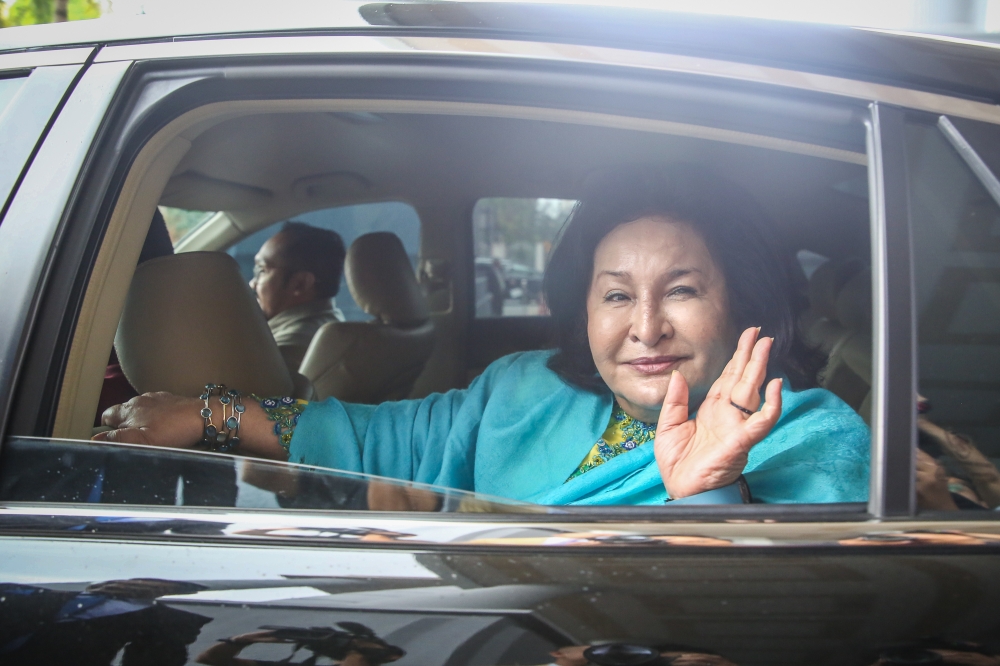
Najib’s wife Datin Seri Rosmah Mansor and his daughter Nooryana Najwa were also present in the courtroom when the decision was being announced.
Najib, who was wearing a dark suit and dark tie, is currently a prisoner due to his conviction in the SRC International Sdn Bhd case and had arrived in a convoy of cars at the court compound at around 8.42am. He was brought into the courtroom under heavy security.
When met after the High Court’s decision, deputy public prosecutor Kamal Baharin Omar confirmed to reporters that the prosecution will study the grounds of judgment and will refer this matter to the attorney-general to decide on whether an appeal would be filed.
The prosecution will have 14 days to file an appeal to the Court of Appeal, if it does decide to file one.
